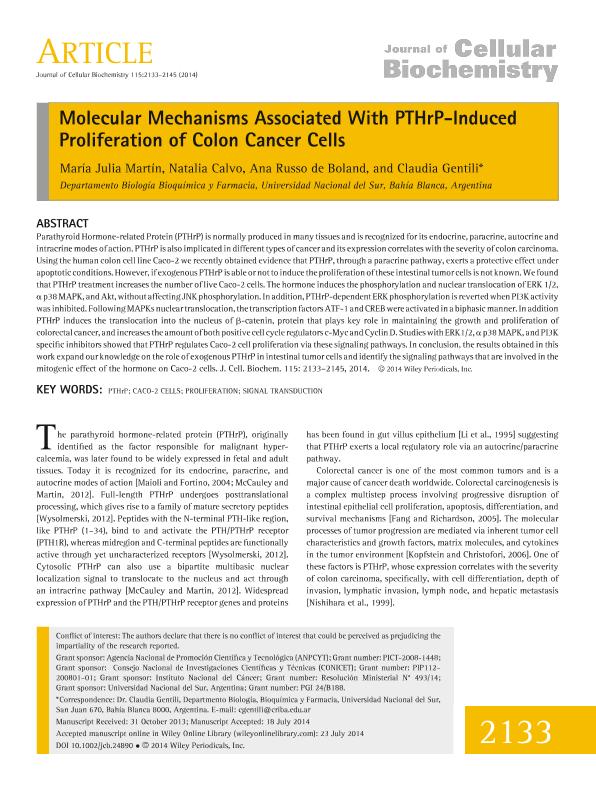Mostrar el registro sencillo del ítem
dc.contributor.author
Martín, María Julia

dc.contributor.author
Calvo, Natalia Graciela

dc.contributor.author
Russo, Ana Josefa

dc.contributor.author
Gentili, Claudia Rosana

dc.date.available
2016-07-05T14:41:28Z
dc.date.issued
2014-12
dc.identifier.citation
Martín, María Julia; Calvo, Natalia Graciela; Russo, Ana Josefa; Gentili, Claudia Rosana; Molecular Mechanisms Associated With PTHrP-Induced Proliferation of Colon Cancer Cells; Wiley; Journal of Cellular Biochemistry; 115; 12; 12-2014; 2133-2145
dc.identifier.issn
0730-2312
dc.identifier.uri
http://hdl.handle.net/11336/6357
dc.description.abstract
Parathyroid Hormone-related Protein (PTHrP) is normally produced in many tissues and is recognized for its endocrine, paracrine, autocrine and intracrine modes of action. PTHrP is also implicated in different types of cancer and its expression correlates with the severity of colon carcinoma. Using the human colon cell line Caco-2 we recently obtained evidence that PTHrP, through a paracrine pathway, exerts a protective effect under apoptotic conditions. However, if exogenous PTHrP is able or not to induce the proliferation of these intestinal tumor cells is not known. We found that PTHrP treatment increases the number of live Caco-2 cells. The hormone induces the phosphorylation and nuclear translocation of ERK 1/2, α p38 MAPK, and Akt, without affecting JNK phosphorylation. In addition, PTHrP-dependent ERK phosphorylation is reverted when PI3K activity was inhibited. Following MAPKs nuclear translocation, the transcription factors ATF-1 and CREB were activated in a biphasic manner. In addition PTHrP induces the translocation into the nucleus of β-catenin, protein that plays key role in maintaining the growth and proliferation of colorectal cancer, and increases the amount of both positive cell cycle regulators c-Myc and Cyclin D. Studies with ERK1/2, α p38 MAPK, and PI3K specific inhibitors showed that PTHrP regulates Caco-2 cell proliferation via these signaling pathways. In conclusion, the results obtained in this work expand our knowledge on the role of exogenous PTHrP in intestinal tumor cells and identify the signaling pathways that are involved in the mitogenic effect of the hormone on Caco-2 cells
dc.format
application/pdf
dc.language.iso
eng
dc.publisher
Wiley

dc.rights
info:eu-repo/semantics/openAccess
dc.rights.uri
https://creativecommons.org/licenses/by-nc-sa/2.5/ar/
dc.subject
Pthrp
dc.subject
Caco-2 Cells
dc.subject
Proliferation
dc.subject
Signal Transduction
dc.subject.classification
Bioquímica y Biología Molecular

dc.subject.classification
Ciencias Biológicas

dc.subject.classification
CIENCIAS NATURALES Y EXACTAS

dc.title
Molecular Mechanisms Associated With PTHrP-Induced Proliferation of Colon Cancer Cells
dc.type
info:eu-repo/semantics/article
dc.type
info:ar-repo/semantics/artículo
dc.type
info:eu-repo/semantics/publishedVersion
dc.date.updated
2016-05-10T14:35:13Z
dc.journal.volume
115
dc.journal.number
12
dc.journal.pagination
2133-2145
dc.journal.pais
Estados Unidos

dc.journal.ciudad
Hoboken
dc.description.fil
Fil: Martín, María Julia. Universidad Nacional del Sur. Departamento de Biología, Bioquímica y Farmacia. Laboratorio de Química Biológica; Argentina. Consejo Nacional de Investigaciones Cientificas y Tecnicas. Centro Cientifico Tecnológico Bahia Blanca. Instituto de Ciencias Biologicas y Biomedicas del Sur; Argentina
dc.description.fil
Fil: Calvo, Natalia Graciela. Universidad Nacional del Sur. Departamento de Biología, Bioquímica y Farmacia. Laboratorio de Química Biológica; Argentina. Consejo Nacional de Investigaciones Cientificas y Tecnicas. Centro Cientifico Tecnológico Bahia Blanca. Instituto de Ciencias Biologicas y Biomedicas del Sur; Argentina
dc.description.fil
Fil: Russo, Ana Josefa. Universidad Nacional del Sur. Departamento de Biología, Bioquímica y Farmacia. Laboratorio de Química Biológica; Argentina
dc.description.fil
Fil: Gentili, Claudia Rosana. Universidad Nacional del Sur. Departamento de Biología, Bioquímica y Farmacia. Laboratorio de Química Biológica; Argentina. Consejo Nacional de Investigaciones Cientificas y Tecnicas. Centro Cientifico Tecnológico Bahia Blanca. Instituto de Ciencias Biologicas y Biomedicas del Sur; Argentina
dc.journal.title
Journal of Cellular Biochemistry

dc.relation.alternativeid
info:eu-repo/semantics/altIdentifier/doi/http://dx.doi.org/10.1002/jcb.24890
dc.relation.alternativeid
info:eu-repo/semantics/altIdentifier/doi/10.1002/jcb.24890
dc.relation.alternativeid
info:eu-repo/semantics/altIdentifier/pmid/25053227
dc.relation.alternativeid
info:eu-repo/semantics/altIdentifier/url/http://onlinelibrary.wiley.com/doi/10.1002/jcb.24890/abstract
Archivos asociados
